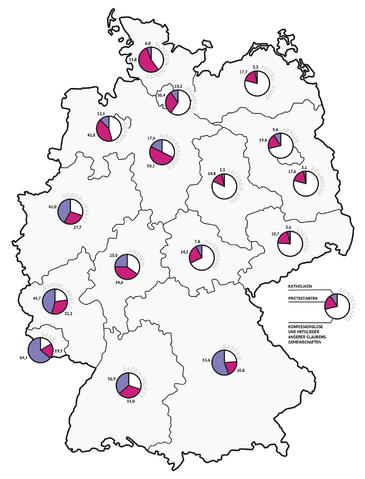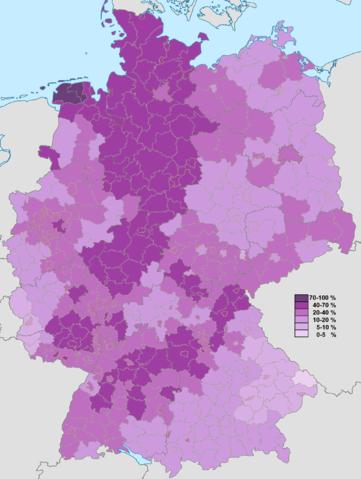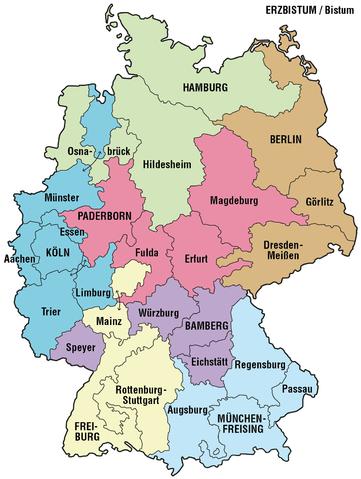GERMANY
Religion

Religion
Cities in GERMANY
| Berlin | Cologne | Dortmund |
| Frankfurt | Hamburg | Heidelberg |
Popular destinations GERMANY
| Bavaria |
Religion
General Article 4 of the constitution guarantees the German population freedom of religion: “Die Freiheit des Glaubens, des Gewissens und die Freiheit des religiösen und weltanschaulichen Bekenntnisses sind unverletzlich. Die ungestörte Religionsausübung wird gewährleistet ”.
In 1919 the actual separation between church and state was declared. Distribution of the two major Christian denominations (Catholicism and Protestantism) on the German states ("Bundesländer") in percentagePhoto: KaterBegemot CC 3.0 Unported no changes made
Distribution of the two major Christian denominations (Catholicism and Protestantism) on the German states ("Bundesländer") in percentagePhoto: KaterBegemot CC 3.0 Unported no changes made
In 2002 about 34% of the population belonged to the Protestant, mainly Lutheran churches and also 34% to the Roman Catholic Church; 3.7% belonged to the Islamic faith.
In 1995 the Jewish community consisted of 72 congregations with a total of almost 54,000 members. In 1933, before Hitler took power, there were approximately 530,000 Jews in Germany. The largest Jewish community is in Berlin, followed by the communities of Frankfurt and Munich. Traditional Jewish communities in Leipzig and Dresden can again actively practice their faith after reunification.
Protestant Churches
There are a total of 18 Lutheran and Reformed (Reformed) churches in West Germany that are united in the Evangelische Kirche in Deutschland (EKD). In 1991, the EKD united with the Bund der Evangelischen Kirchen from the former GDR.
The Evangelical churches in Germany belong to the World Council of Churches and there is close cooperation with the Roman Catholic Church.
The Protestant churches organize biennial national meetings: the so-called church days. Percentage of the Protestant population at the district level according to the results of the 2011 census in GermanyPhoto: Michael Sander CC 3.0 Unported no changes made
Percentage of the Protestant population at the district level according to the results of the 2011 census in GermanyPhoto: Michael Sander CC 3.0 Unported no changes made
Catholic Church
Until 1994, the Roman Catholic Church was divided into 23 dioceses, five of which were archdioceses. After a realignment due to German unity, Germany currently has 20 dioceses and seven archdioceses, Bamberg, Cologne, Freiburg, Munich and Freising, Paderborn, Hamburg (new) and Berlin (formerly a diocese). The Archdiocese of Cologne is the richest in the world, partly thanks to the church tax (“Kirchensteuer”).
The Roman Catholic Church organizes biennial gatherings: the so-called Catholic Days. Dioceses and Archdioceses in GermanyPhoto: Maximilian Dörrbecker (Chumwa) CC 2.5 Generic no changes made
Dioceses and Archdioceses in GermanyPhoto: Maximilian Dörrbecker (Chumwa) CC 2.5 Generic no changes made
Sources
Ayer, E.H. / Germany
Lucent Books
Egert-Romanowska, J. / Duitsland
Van Reemst
Europese Unie : vijftien landendocumentaties
Europees Platform voor het Nederlandse Onderwijs
Mark, D.F.W. van der / De Bondsrepubliek Duitsland voor en na 1990 : geschiedenis, politiek, economie en ruimtelijke ontwikkeling
Landensurveys
Tatsachen über Deutschland
CIA - World Factbook
BBC - Country Profiles
Copyright: Team The World of Info